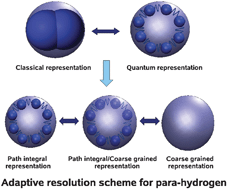Adaptive resolution simulation of liquid para-hydrogen: testing the robustness of the quantum-classical adaptive coupling
Abstract
Adaptive resolution simulations for classical systems are currently made within a reasonably consistent theoretical framework. Recently we have extended this approach to the quantum-classical coupling by mapping the quantum nature of an atom onto a classical polymer ring representation within the path integral approach [Poma & Delle Site, Phys. Rev. Lett., 2010, 104, 250201]. In this way the process of interfacing adaptively a quantum representation to a classical one corresponds to the problem of interfacing two regions with a different number of effective “classical” degrees of freedom; thus the classical formulation of the adaptive algorithm applies straightforwardly to the quantum-classical problem. In this work we show the robustness of such an approach for a liquid of para-hydrogen at low temperature. This system represents a highly challenging conceptual and technical test for the adaptive approach due to the extreme thermodynamical conditions where quantum effects play a central role.

- This article is part of the themed collection: Multiscale modelling

 Please wait while we load your content...
Please wait while we load your content...